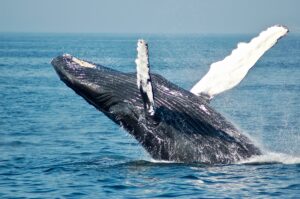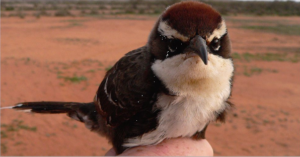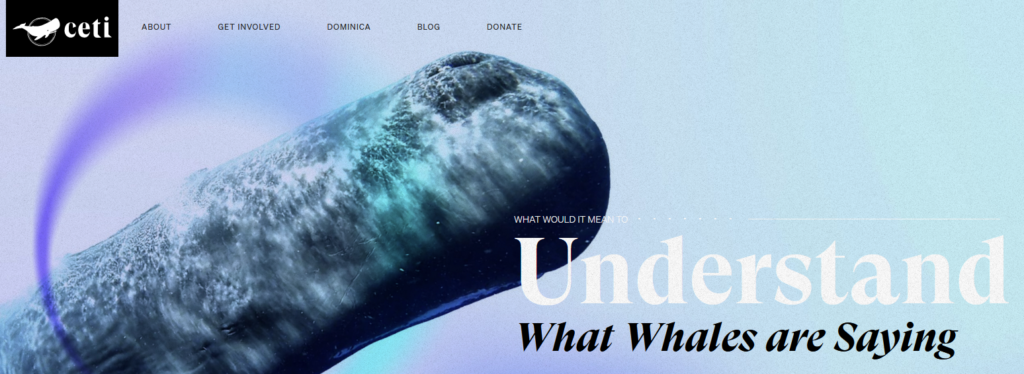
Blog by Barrie Cameron, Author, in which he asks the question: Where will we encounter alien languages?
Non-human languages
Historically, at least in recent times, we have tended to assume that it is in space where we will first encounter alien languages. Or that news of it will come from space. But what are the probabilities that our first encounter with an alien language will not be in space but within our own biosphere, and with creatures that already have communication systems that are not human and which we presently cannot understand?
how to speak whale
I have just finished reading a remarkable non-fiction book by Tom Mustill entitled “how to speak whale: A Voyage into the Future of Animal Communication“, ISBN: 978-0-00-836339-0.

Photo by Todd Cravens on Unsplash
In his book, Mustill takes great pains not to call the communication systems of the whales, and of other cetaceans, languages. This is because these systems are still being studied and are not yet sufficiently understood by scientists to be recognized as languages. So far researchers have revealed the fantastic complexity of these systems in terms of frequency range, diversity of wave packet shapes and lengths, and other sound characteristics. But there is presently insufficient evidence accumulated to date of language-type structure and meaning. Such evidence can only come from the analysis of huge amounts of collaborative data. Consequently human language experts are understandably resistant to labeling these cetacean communication systems, and those of other animal species, languages. More evidence is needed.
Bird communications
But I’m writing this blog post as a science fiction author. As such I feel I have some artistic license. Also before reading Mustill’s book, I, like many others, had noticed that some birds appear to have some sort of language or languages. Of course suspecting or believing birds have languages doesn’t mean that they actually do have languages. We may just be guilty of anthropomorphism, either through wishful thinking or misinterpretation of their calls as speech when they may just be music.
A personal view
Personally, I believe there is more to the bird song than just music. That is not to belittle music. But we notice that after we place seed on our bird feeder, the sparrows do not arrive randomly over the course of the following hours, first one or two fly down to inspect the food and then fly off. Then shortly after the crowd arrives. These are not birds who live locally, but who arrive from further a field. And then there is the case of the black bird bathing in a puddle on the walking track away ahead of us. A bird calls a sequence of notes from the trees on our right and immediately the bird in the puddle lifts its head and flies off into the trees. Coincidence?
Chestnut-crowned babbler
The subject of bird communication is touched on by Mustill in his book (see below the reference to Sabrina Engesser’s work with chestnut-crowned babblers in Australia). Biologists and other specialists referenced by Mustill in his book avoid calling these animal communication systems languages. This is understandable professional discretion. Discretion which is necessary while definitive evidence is gathered and analyzed to determine whether the animal communication systems can be considered to have language characteristics as defined by human language experts. The paper by Sabrina Engesser, referenced below, describes research relating to this question:

“Chestnut-crowned babbler calls are composed of meaningless shared building blocks“, paper by Sabrina Engesser, et al, on the PNAS website. (For professional information concerning Sabrina Engesser refer to the Department of Comparative Linguistics, University of Zurich, 8032 Zurich, Switzerland).
Collecting and processing big data requires a huge project
One of the problems that Mustill discusses in his book is the extreme difficulty in collecting sufficient data and then analysing that data within the span of a human researcher’s working life.
Project CETI
Mustill explains in his book how Project CETI was founded to answer this challenge. CETI will use AI and deep neural networks to understand how the whale communication system works. Mustill mentions in his book that the experts engaged on this new and mammoth project estimate that a result may take a decade to produce. But this delay would be as nothing compared with the very many researcher-decades that would otherwise be required to correlate and analyse the huge amount of whale sound, activity, and environmental data necessary to produce convincing evidence of language.
CETI
“We’re a collaborative nonprofit, interdisciplinary scientific and conservation initiative”

Tom Mustill’s book ‘how to speak whale‘
I highly recommend that you read Tom Mustill‘s book, ‘how to speak whale‘, particularly if you have interest in whales and their songs, or in non-human communication systems generally. The many researchers he references in his book are all undertaking, or have undertaken, extremely important research that is expected to ultimately inform humanity of the intelligence of animals. This work will not only be of benefit to the animal species concerned, but by consequence, it will further encourage the drive to full sustainability of our shared biosphere, and thereby assist the long term survival of species and of humanity itself.